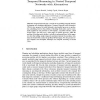Free Online Productivity Tools
i2Speak
i2Symbol
i2OCR
iTex2Img
iWeb2Print
iWeb2Shot
i2Type
iPdf2Split
iPdf2Merge
i2Bopomofo
i2Arabic
i2Style
i2Image
i2PDF
iLatex2Rtf
Sci2ools
103
click to vote
CSCLP
2007
Springer
2007
Springer
Temporal Reasoning in Nested Temporal Networks with Alternatives
Temporal networks play a crucial role in modeling temporal relations in planning and scheduling applications. Temporal Networks with Alternatives (TNAs) were proposed to model alternative and parallel processes in production scheduling, however the problem of deciding which nodes can be consistently included in such networks is NP-complete. A tractable subclass, called Nested TNAs, can still cover a wide range of real-life processes, while the problem of deciding node validity is solvable in polynomial time. In this paper, we show that adding simple temporal constraints (instead of precedence relations) to Nested TNAs makes the problem NP-hard again. We also present several complete and incomplete techniques for temporal reasoning in Nested TNAs.
Related Content
| Added | 07 Jun 2010 |
| Updated | 07 Jun 2010 |
| Type | Conference |
| Year | 2007 |
| Where | CSCLP |
| Authors | Roman Barták, Ondrej Cepek, Martin Hejna |
Comments (0)

